イベント&アクティビティ
Conference presents results from DIJ’s research cluster on ‘Local Communities’
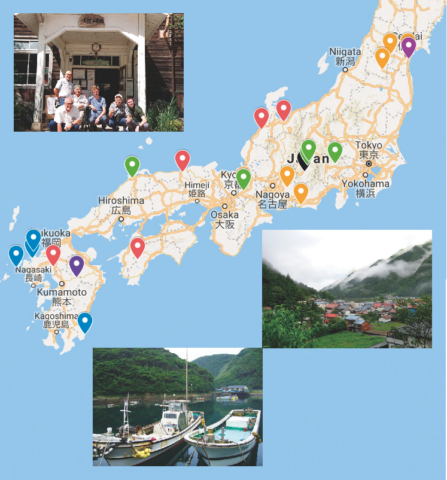
Six former and current DIJ researchers who have contributed to the DIJ’s research cluster The Future of Local Communities in Japan – Risks and Opportunities in the Face of Multiple Challenges will give presentations on their research results at the conference ‘Local Self-organization and Civic Engagement in Regional Japan’ on March 7, 2023, on-site only at the DIJ. Topics covered include social welfare provision, volunteerism, regional theatre, fishery cooperatives, and shifting state-society relations. They will be complemented with presentations by prominent Japanese scholars in the field. The conference will close with a book break introducing Rethinking Locality in Japan (eds. Sonja Ganseforth & Hanno Jentzsch, Routledge 2022). Details and registration here
DIJ researchers at AAS conference in Boston
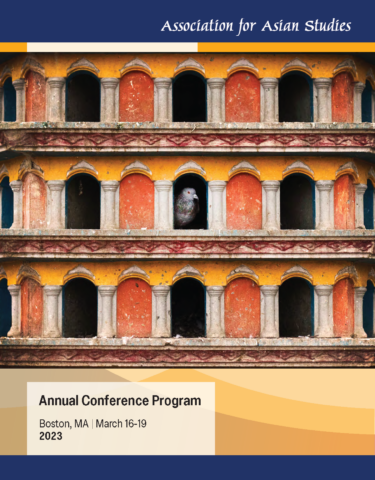
DIJ historian David M. Malitz and social scientist Nora Kottmann will present results from their latest research at the upcoming annual conference of the Association for Asian Studies (AAS) in Boston. David will give his paper “Written out of History: Japanese-Siamese (Thai) Relations Prior to the 1932 Revolution” in the panel Hedging Towards Hegemony: Deconstructing the Myth of the “Bamboo Diplomacy” in Thailand. Nora is organizer and chair of the panel Privileged transnational families in and from East Asia: Gendered practices, gendered spaces? Her paper “(Un)Voluntarily trapped in heteronormativity: Familial decision making of transnational professionals in Tokyo” analyzes how and where transnational corporate professionals and their families ‘do family’ from a gender perspective.
Franz Waldenberger chairs panel on ‘Digital and green transformation’

DIJ director Franz Waldenberger will chair the panel ‘Digital and green transformation’ at the two-day conference Reforming Capitalism, Going Digital and Going Green: Does Japan Hold Answers? organized by Oxford University’s Nissan Institute of Japanese Studies. Its goals are to go behind the international headlines on inflation, cost of living crises, and interest rates to ask what can we learn from the Japanese experience of our shared challenges. Topics include productivity and investment, ‘leveling up’, digital and green transformation, and the common quest to reform capitalism and build a new ‘growth model’. The conference brings together sixteen experts from Japan and Europe, across the academic, business, and political spectrum to help develop shared solutions to our shared problems. It takes place on February 17-18, 2023 at Saïd Business School in Oxford. Details and programme here
Online roundtable on Japanese-Thai Defense Relations in the Indo-Pacific Era
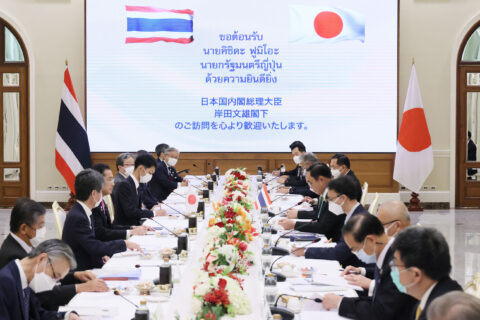
In December 2022, the Japanese government announced major changes to its defense policies, including a new National Security Strategy. As a founding member of ASEAN enjoying long and close relations with Japan, Thailand offers an interesting case study of Japan’s defense diplomacy in the region. Since 2005, Japan has been participating in annual US-Thai hosted multinational military exercises. At the same time, Thailand has also strengthened its defense relationship with China. Nevertheless, a bilateral defense agreement was signed in May 2022 during Prime Minister Kishida’s visit to Thailand. This online roundtable will explore Japanese-Thai defense relations in the light of Japan’s new National Security Strategy, of the Japanese-Thai bilateral defense agreement, and of the closer relations between Thailand and China from Japanese and Thai perspectives. Moderated by DIJ’s David M. Malitz, it features Saya Kiba (Kobe City University of Foreign Studies/National Defense Academy of Japan) and Kitti Prasirtsuk (Thammasat University, Bangkok). Details here
Joint DIJ & ICAS book talk The EU Migrant Generation in Asia
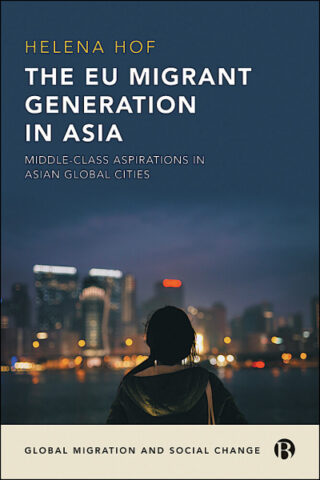
Jointly with the Institute of Contemporary Asian Studies (ICAS) at Temple University Japan, the DIJ sponsors the book talk The EU Migrant Generation in Asia – Middle-Class Aspirations in Asian Global Cities (Bristol UP, 2022) by Helena Hof. Hof’s book studies early-career migration by young Europeans and the changing outlook of Japan and Singapore. It shows how migration to Asian business centres has become a way of distinction and an alternative way of middle-class reproduction. Japan’s and Singapore’s changing migration regimes, however, pose different barriers to the migrants, which results in ambiguous feelings towards their host societies. Helena Hof is Senior Research and Teaching Fellow at the University of Zurich and a Research Fellow at the Socio-Cultural Department of the Max Planck Institute for the Study of Religious and Ethnic Diversity. The talk takes places on February 10 from 19:00-20:30 JST at Temple University Japan Campus. Registration is not required.
Celia Spoden presents research on ‘Telepresence Robots at School in Japan and Germany’
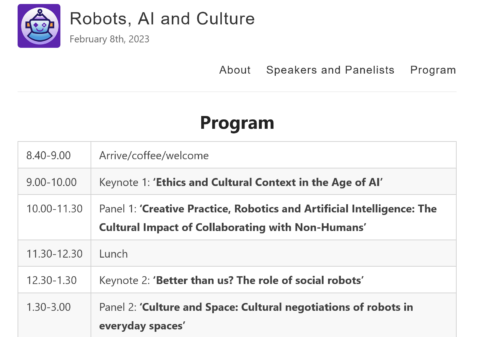
Together with Arisa Ema (University of Tokyo), DIJ social scientist Celia Spoden will give an online presentation on ‘Cyber-Physical Presence: Telepresence Robots at School in Japan and Germany’ in the panel ‘Culture and Space: Cultural negotiations of robots in everyday spaces’ at the Robots, AI and Culture symposium. The one-day symposium on February 8 is hosted by the University of Sydney and focuses on cultural translation, transference, and adoption of developing technologies in robotics and artificial intelligence. Celia’s co-authored paper on the use of telepresence robots in schools is based on a qualitative study that compares the Japanese case of the avatar-robot OriHime with the usage of AV1 in German schools. The avatar-robots aim to enable children who cannot attend school due to an illness, disabilities, or extended hospital stays to stay socially connected, restore normality, and prevent social isolation. Details and registration here
Barbara Holthus discusses Tokyo Olympics legacy at OAG lecture
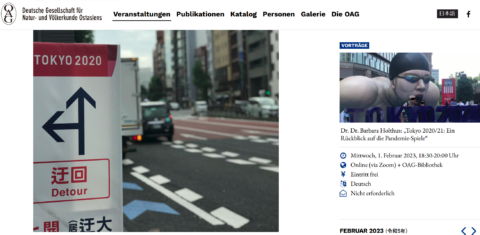
Since Tokyo won the bid to host the Olympic Games in 2013, the year 2020 was traded as both a “goal” and a “new beginning” in the country. To this end, the Olympic Games were instrumentalised in a variety of ways, including Tokyo as the capital of “Cool Japan”; the most technologically sophisticated Olympics; economic rebound; a new volunteer culture. In this talk on 1 February at the OAG Tokyo and online, DIJ deputy director and Olympic volunteer Barbara Holthus will contrast these efforts to reinvent the country and the instrumentalisation of the Olympics with what ultimately became of these lofty goals. What was Tokyo 2020/21 and what remains socially, economically, (infra)structurally? Barbara’s lecture also offers insights into the pandemic Games themselves through participant observation as “field cast” volunteers at the Paralympic Games. For more information on research related to the Olympics, see the DIJ’s special project on the Tokyo Olympics and the open access book publication Japan Through the Lens of the Tokyo Olympics.
Hybrid DIJ Study Group session on Digital Hermeneutics
 Perspectives from the history and philosophy of science have helped conceptualizing knowledge production in the digital humanities (DH). In the laboratory setting, the concept of the trading zone has proved to be fruitful. Arguing that DH tools can be considered as experimental systems in the sense of Hans-Jörg Rheinberger, this lecture aims at proceeding beyond the laboratory setting and embrace the heterogeneity of DH scholarship as an interdisciplinary field of research. Based on the results of a two-day workshop at the German Institute for Japanese Studies, the lecture will try to integrate perspectives on epistemic virtues from the Global South, most notably those reflecting the decolonization of our current knowledge infrastructure and economy. Details and registration here
Perspectives from the history and philosophy of science have helped conceptualizing knowledge production in the digital humanities (DH). In the laboratory setting, the concept of the trading zone has proved to be fruitful. Arguing that DH tools can be considered as experimental systems in the sense of Hans-Jörg Rheinberger, this lecture aims at proceeding beyond the laboratory setting and embrace the heterogeneity of DH scholarship as an interdisciplinary field of research. Based on the results of a two-day workshop at the German Institute for Japanese Studies, the lecture will try to integrate perspectives on epistemic virtues from the Global South, most notably those reflecting the decolonization of our current knowledge infrastructure and economy. Details and registration here
Andreas Fickers, Luxembourg Centre for Contemporary and Digital History/DIJ Tokyo





 Open Access
Open Access
